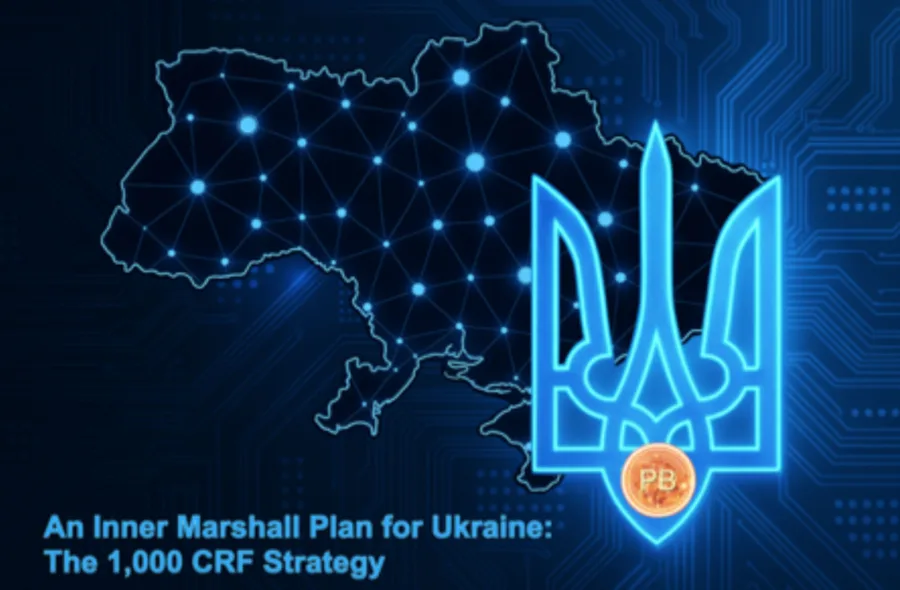Shifting the power to communities: an “inner” Marshall Plan for Ukraine?

How can communities reduce their dependence on aid while building social and economic resilience and a democratic mindset? Vadim Georgienko’s citizen token system provides an elegant solution.
Foreign aid has been essential to Ukraine’s ability to resist Russia’s ongoing aggression since 2022 and remains so. But with aid comes a risk of dependency. What’s needed, according to John Smith Fellow Vadim Georgienko, are “complementary solutions” that give communities agency to build resilience from within.
Vadim, a social entrepreneur and systems architect, has worked with war-affected communities in Ukraine to implement a citizen token system (CTS). The system has multiple benefits. It builds social value as citizens donate their time and resources. At the same time, it increases citizens’ participation in decision-making and supports the local economy.
“CTS is a practical complement to aid,” Vadim explains. “It’s designed to reduce dependency over time by embedding governance and value-creation within communities.” In the context of the cuts to USAID by the current US administration, finding alternatives to aid and shifting the power imbalance between donor and recipient have become urgent priorities.
“What we’re proposing is like an Inner Marshall Plan for Ukraine. “Inner” refers to how the capital is circulated, governed and regenerated within communities themselves.”
Community Resilience Fund
One of the models within the citizen token system is the community resilience fund (CRF). Through this model, communities can support local initiatives through structured, token-based decision-making involving local businesses. A donor can provide initial funding to a local CRF, and the CRF then issues governance tokens backed by that funding.
Then, ‘smart contracts’ are created. These put a value on contributions people can make – through giving their time, labour or resources – to meet needs they’ve identified in the community. These could be delivering food to displaced people or sending warm clothes to relatives on the frontline.
In return for their contributions, people receive governance tokens, which allow them to vote on how the community resilience fund capital is allocated.
Active participation
Vadim says: “Even before people start using the tokens, they’ve generated added value to ‘public goods’ through their contributions to the community. The tokens cannot be cashed in their pockets. In the case of the CRF people use them to vote for investments in small local businesses, such as cafes, bakeries and shops. With other models, people can vote to support non-profit projects.
“Imagine a map of Ukraine divided into 1,000 local communities. Each one has its own community resilience fund: a permanent engine generating added value to public goods, supporting the economy via small businesses, and shifting mental models from passive aid receipt to active governance participation.”
A circular system
When people use their tokens to vote, the business or project receives a temporary investment from the community resilience fund with no collateral and no fees. After using the capital, the business returns it to the fund and the cycle starts again, keeping the capital flowing in ‘circles of support’ in the local economy.
Inna Starchikova, a colleague of Vadim’s, set up a pilot of the system in the town of Rudky in western Ukraine after she was displaced from her home in Odesa. Since setting up the system, she’s seen how it generates community solidarity and incredible customer loyalty: more than 90% of people who use their citizen tokens to vote for a business go on to become regular customers.
Vadim says: “It’s a way for communities to actively take responsibility for supporting local businesses in a self-sustaining cycle.”
Building democratic skills
According to Vadim, as well as reducing dependency on aid, the system strengthens citizens’ democratic values.
“It helps people to develop their governance skills,” he says. “This is important because in Ukraine, people often don’t participate in decision-making processes. This is a threat to democracy at a time when countries are shifting to populism and authoritarianism.
“But when you have a process like this in your life, you can practise your democratic skills via regular participation in decision-making. It supports a change in mindset.”
Citizen Capital conference
Vadim will share more about his approach at ‘Citizen Capital: From Within’, an online conference on 12 June, in the hope that it can be replicated in other contexts around the world.
Attendees can hear from the Rudky community, which has implemented the system, join an international experts’ session, and explore ways to incorporate this approach into future international aid programmes.
If you’d like to attend the conference, please register your interest or contact Vadim for more information at invfovg@gmail.com
Find out about our fellowship programmes
